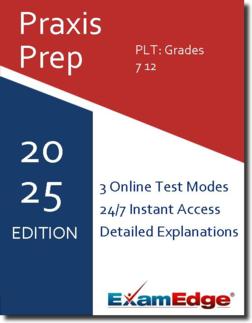Praxis PLT: Grades 7-12 (5624) Practice Tests & Test Prep by Exam Edge - Blogs
Based on 20 Reviews
- Real Exam Simulation: Timed questions and matching content build comfort for your Praxis PLT: Grades 7-12 test day.
- Instant, 24/7 Access: Web-based Praxis Principles of Learning and Teaching Grades 7-12 practice exams with no software needed.
- Clear Explanations: Step-by-step answers and explanations for your Praxis exam to strengthen understanding.
- Boosted Confidence: Reduces anxiety and improves test-taking skills to ace your Praxis Principles of Learning and Teaching Grades 7-12 (5624).



